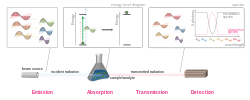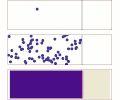In chemistry, the molar absorption coefficient or molar attenuation coefficient (ε) is a measurement of how strongly a chemical species absorbs, and thereby...
6 KB (760 words) - 18:58, 26 June 2024
Extinction coefficient refers to several different measures of the absorption of light in a medium: Attenuation coefficient, sometimes called "extinction...
756 bytes (116 words) - 20:48, 5 March 2023
"absorption coefficient")[citation needed] The Molar attenuation coefficient (also called "molar absorptivity"), which is the absorption coefficient divided...
9 KB (801 words) - 16:23, 1 December 2024
related concept is molar absorptivity. They are quantitatively related by (mass attenuation coefficient) × (molar mass) = (molar absorptivity). Tables of photon...
8 KB (909 words) - 23:21, 10 May 2024
the attenuation coefficient. The attenuation coefficient of a volume is the sum of absorption coefficient and scattering coefficients: μ = μ a + μ s ...
16 KB (2,210 words) - 21:56, 26 November 2024
cross-section is closely related to molar absorptivity ε {\displaystyle \varepsilon } and mass absorption coefficient. σ = ln ( 10 ) × 10 3 N A × ε {\displaystyle...
4 KB (505 words) - 11:01, 11 December 2024
Fluorophore (redirect from Absorption peak)
the excitation and emission spectra (usually one peak each). Molar absorption coefficient (in mol−1cm−1): links the quantity of absorbed light, at a given...
29 KB (2,272 words) - 22:09, 11 November 2024
electric field changes the molar absorption coefficient of the sample, which can be measured using traditional absorption or emission spectroscopic methods...
2 KB (188 words) - 03:41, 4 June 2024
Discussed below are the absorption properties of the most important chromophores in tissue. The molar extinction coefficient ( ε {\displaystyle \varepsilon...
13 KB (1,736 words) - 15:04, 22 October 2024
The absorption peaks of chlorophyll a are at 465 nm and 665 nm. Chlorophyll a fluoresces at 673 nm (maximum) and 726 nm. The peak molar absorption coefficient...
37 KB (3,755 words) - 15:40, 29 December 2024
Ultraviolet–visible spectroscopy (redirect from UV-Visible molecular absorption)
affect the absorption spectrum of an organic compound. Tyrosine, for example, increases in absorption maxima and molar extinction coefficient when pH increases...
34 KB (4,413 words) - 22:17, 15 November 2024
Absorbance (section Attenuation coefficient)
the absorbance; ε {\displaystyle \varepsilon } is the molar attenuation coefficient or absorptivity of the attenuating species; ℓ {\displaystyle \ell }...
21 KB (2,915 words) - 01:54, 14 November 2024
Beer–Lambert law (redirect from Lambert's law of absorption)
laws because scattering and absorption have the same effect. Thus a scattering coefficient μs and an absorption coefficient μa can be combined into a total...
27 KB (3,871 words) - 16:20, 11 December 2024
Thermal expansion (redirect from Coefficient of thermal expansion)
strain) divided by the change in temperature is called the material's coefficient of linear thermal expansion and generally varies with temperature. If...
49 KB (6,088 words) - 17:28, 25 November 2024
Transmittance (section Other radiometric coefficients)
transmission coefficient, which is the ratio of the transmitted to incident electric field. Internal transmittance refers to energy loss by absorption, whereas...
8 KB (1,129 words) - 19:02, 22 March 2024
Refractive index (redirect from Optical extinction coefficient)
wave propagates through the material.: 128 It is related to the absorption coefficient, α abs {\displaystyle \alpha _{\text{abs}}} , through:: 41 α abs...
80 KB (9,015 words) - 01:05, 4 January 2025
Circular dichroism (section Molar circular dichroism)
\varepsilon _{\mathrm {R} }} are the molar extinction coefficients for LCP and RCP light, C {\displaystyle C} is the molar concentration, l {\displaystyle...
29 KB (4,008 words) - 16:34, 15 December 2024
Mathematical descriptions of opacity (category Scattering, absorption and radiative transfer (optics))
attenuation coefficient; see attenuation coefficient for details; molar absorption coefficient or molar extinction coefficient, also called molar absorptivity, is...
18 KB (2,745 words) - 16:24, 20 April 2024
the absorption spectra of two species (whether by using molar absorptivity for the representation, or by using absorbance and keeping the same molar concentration...
7 KB (837 words) - 10:28, 20 May 2024
Opacity (category Scattering, absorption and radiative transfer (optics))
is another term for the mass attenuation coefficient (or, depending on context, mass absorption coefficient, the difference is described here) κ ν {\displaystyle...
8 KB (1,149 words) - 19:51, 21 August 2024
Ammonia solution (section Absorption refrigeration)
ammonia per litre of solution, and has a molarity of approximately 18 mol/L. At higher temperatures, the molarity of the saturated solution decreases and...
17 KB (1,594 words) - 17:05, 1 January 2025
c of the solute (the solvent is considered non-absorbing). The “Absorption Coëfficient” that Beer defined is actually the transmittance (or transmission...
6 KB (687 words) - 08:43, 20 August 2024
\left({\frac {1}{\tau }}-{\frac {1}{\tau _{0}}}\right)} Alternatively, the molar absorptivity, ε, and analyte concentration, C, can be determined from the ratio...
11 KB (1,539 words) - 00:29, 24 August 2024
largely experimental results. They can be used to solve for the diffusion coefficient, D. Fick's first law can be used to derive his second law which in turn...
57 KB (8,148 words) - 06:53, 18 October 2024
Variable pathlength cell (category Absorption spectroscopy)
the path length), ℓ. The absorption coefficient can, in turn, be written as a product of either a molar absorptivity of the absorber, ε, and the concentration...
7 KB (904 words) - 10:50, 19 October 2024
elasticity in economics electromotive force in chemistry, the molar extinction coefficient of a chromophore in mathematics, a surreal number that is bigger...
37 KB (3,447 words) - 02:31, 3 January 2025
extensions, for example the Ghose filter: Partition coefficient log P in −0.4 to +5.6 range Molar refractivity from 40 to 130 Molecular weight from 180...
10 KB (1,196 words) - 13:47, 23 November 2024
1016/0003-9861(59)90090-6. PMID 13650640. Collier HB (1973). "Letter: A note on the molar absorptivity of reduced Ellman's reagent, 3-carboxylato-4-nitrothiophenolate"....
6 KB (476 words) - 20:56, 21 June 2024
Adsorption (redirect from Absorption isotherm)
adsorbate on the surface of the adsorbent. This process differs from absorption, in which a fluid (the absorbate) is dissolved by or permeates a liquid...
55 KB (7,212 words) - 11:02, 11 October 2024
which A is the absorbance measured by the instrument, ε is the molar absorption coefficient of the sample, l is the pathlength of the light beam through...
17 KB (1,788 words) - 16:06, 5 December 2023
















